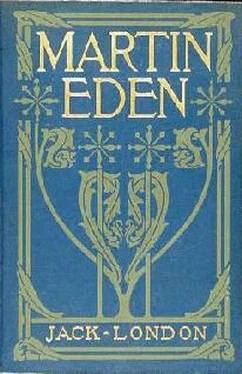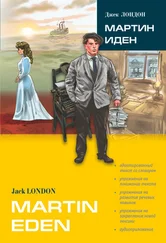Martin turned upon him.
"A cheap judgment," he remarked quietly. "I heard it first in the City Hall Park, on the lips of a workingman who ought to have known better. I have heard it often since, and each time the clap-trap of it nauseates me. You ought to be ashamed of yourself. To hear that great and noble man’s name upon your lips is like finding a dew-drop in a cesspool. You are disgusting."
It was like a thunderbolt. Judge Blount glared at him with apoplectic countenance, and silence reigned. Mr. Morse was secretly pleased. He could see that his daughter was shocked. It was what he wanted to do-to bring out the innate ruffianism of this man he did not like.
Ruth’s hand sought Martin’s beseechingly under the table, but his blood was up. He was inflamed by the intellectual pretence and fraud of those who sat in the high places. A Superior Court Judge! It was only several years before that he had looked up from the mire at such glorious entities and deemed them gods.
Judge Blount recovered himself and attempted to go on, addressing himself to Martin with an assumption of politeness that the latter understood was for the benefit of the ladies. Even this added to his anger. Was there no honesty in the world?
"You can’t discuss Spencer with me," he cried. "You do not know any more about Spencer than do his own countrymen. But it is no fault of yours, I grant. It is just a phase of the contemptible ignorance of the times. I ran across a sample of it on my way here this evening. I was reading an essay by Saleeby on Spencer. You should read it. It is accessible to all men. You can buy it in any book-store or draw it from the public library. You would feel ashamed of your paucity of abuse and ignorance of that noble man compared with what Saleeby has collected on the subject. It is a record of shame that would shame your shame."
"‘The philosopher of the half-educated,’ he was called by an academic Philosopher who was not worthy to pollute the atmosphere he breathed. I don’t think you have read ten pages of Spencer, but there have been critics, assumably more intelligent than you, who have read no more than you of Spencer, who publicly challenged his followers to adduce one single idea from all his writings-from Herbert Spencer’s writings, the man who has impressed the stamp of his genius over the whole field of scientific research and modern thought; the father of psychology; the man who revolutionized pedagogy, so that to-day the child of the French peasant is taught the three R’s according to principles laid down by him. And the little gnats of men sting his memory when they get their very bread and butter from the technical application of his ideas. What little of worth resides in their brains is largely due to him. It is certain that had he never lived, most of what is correct in their parrot-learned knowledge would be absent."
"And yet a man like Principal Fairbanks of Oxford-a man who sits in an even higher place than you, Judge Blount-has said that Spencer will be dismissed by posterity as a poet and dreamer rather than a thinker. Yappers and blatherskites, the whole brood of them! ‘"First Principles" is not wholly destitute of a certain literary power,’ said one of them. And others of them have said that he was an industrious plodder rather than an original thinker. Yappers and blatherskites! Yappers and blatherskites!"
Martin ceased abruptly, in a dead silence. Everybody in Ruth’s family looked up to Judge Blount as a man of power and achievement, and they were horrified at Martin’s outbreak. The remainder of the dinner passed like a funeral, the judge and Mr. Morse confining their talk to each other, and the rest of the conversation being extremely desultory. Then afterward, when Ruth and Martin were alone, there was a scene.
"You are unbearable," she wept.
But his anger still smouldered, and he kept muttering, "The beasts! The beasts!"
When she averred he had insulted the judge, he retorted:-
"By telling the truth about him?"
"I don’t care whether it was true or not," she insisted. "There are certain bounds of decency, and you had no license to insult anybody."
"Then where did Judge Blount get the license to assault truth?" Martin demanded. "Surely to assault truth is a more serious misdemeanor than to insult a pygmy personality such as the judge’s. He did worse than that. He blackened the name of a great, noble man who is dead. Oh, the beasts! The beasts!"
His complex anger flamed afresh, and Ruth was in terror of him. Never had she seen him so angry, and it was all mystified and unreasonable to her comprehension. And yet, through her very terror ran the fibres of fascination that had drawn and that still drew her to him-that had compelled her to lean towards him, and, in that mad, culminating moment, lay her hands upon his neck. She was hurt and outraged by what had taken place, and yet she lay in his arms and quivered while he went on muttering, "The beasts! The beasts!" And she still lay there when he said: "I’ll not bother your table again, dear. They do not like me, and it is wrong of me to thrust my objectionable presence upon them. Besides, they are just as objectionable to me. Faugh! They are sickening. And to think of it, I dreamed in my innocence that the persons who sat in the high places, who lived in fine houses and had educations and bank accounts, were worth while!"
"Come on, let’s go down to the local."
So spoke Brissenden, faint from a hemorrhage of half an hour before-the second hemorrhage in three days. The perennial whiskey glass was in his hands, and he drained it with shaking fingers.
"What do I want with socialism?" Martin demanded.
"Outsiders are allowed five-minute speeches," the sick man urged. "Get up and spout. Tell them why you don’t want socialism. Tell them what you think about them and their ghetto ethics. Slam Nietzsche into them and get walloped for your pains. Make a scrap of it. It will do them good. Discussion is what they want, and what you want, too. You see, I’d like to see you a socialist before I’m gone. It will give you a sanction for your existence. It is the one thing that will save you in the time of disappointment that is coming to you."
"I never can puzzle out why you, of all men, are a socialist," Martin pondered. "You detest the crowd so. Surely there is nothing in the canaille to recommend it to your aesthetic soul." He pointed an accusing finger at the whiskey glass which the other was refilling. "Socialism doesn’t seem to save you."
"I’m very sick," was the answer. "With you it is different. You have health and much to live for, and you must be handcuffed to life somehow. As for me, you wonder why I am a socialist. I’ll tell you. It is because Socialism is inevitable; because the present rotten and irrational system cannot endure; because the day is past for your man on horseback. The slaves won’t stand for it. They are too many, and willy-nilly they’ll drag down the would-be equestrian before ever he gets astride. You can’t get away from them, and you’ll have to swallow the whole slave-morality. It’s not a nice mess, I’ll allow. But it’s been a-brewing and swallow it you must. You are antediluvian anyway, with your Nietzsche ideas. The past is past, and the man who says history repeats itself is a liar. Of course I don’t like the crowd, but what’s a poor chap to do? We can’t have the man on horseback, and anything is preferable to the timid swine that now rule. But come on, anyway. I’m loaded to the guards now, and if I sit here any longer, I’ll get drunk. And you know the doctor says-damn the doctor! I’ll fool him yet."
It was Sunday night, and they found the small hall packed by the Oakland socialists, chiefly members of the working class. The speaker, a clever Jew, won Martin’s admiration at the same time that he aroused his antagonism. The man’s stooped and narrow shoulders and weazened chest proclaimed him the true child of the crowded ghetto, and strong on Martin was the age-long struggle of the feeble, wretched slaves against the lordly handful of men who had ruled over them and would rule over them to the end of time. To Martin this withered wisp of a creature was a symbol. He was the figure that stood forth representative of the whole miserable mass of weaklings and inefficients who perished according to biological law on the ragged confines of life. They were the unfit. In spite of their cunning philosophy and of their antlike proclivities for coцperation, Nature rejected them for the exceptional man. Out of the plentiful spawn of life she flung from her prolific hand she selected only the best. It was by the same method that men, aping her, bred race-horses and cucumbers. Doubtless, a creator of a Cosmos could have devised a better method; but creatures of this particular Cosmos must put up with this particular method. Of course, they could squirm as they perished, as the socialists squirmed, as the speaker on the platform and the perspiring crowd were squirming even now as they counselled together for some new device with which to minimize the penalties of living and outwit the Cosmos.
Читать дальше












